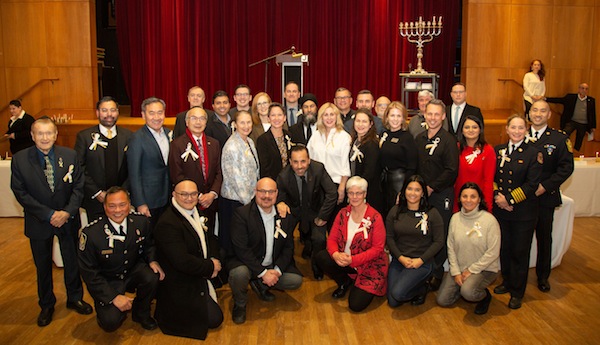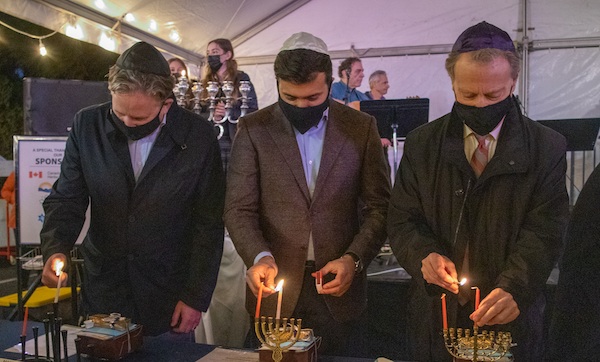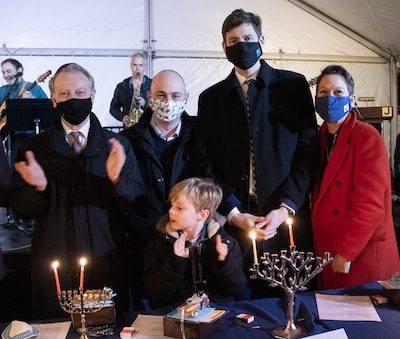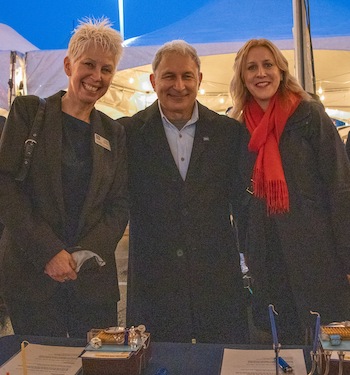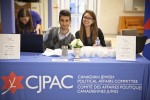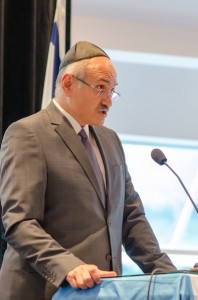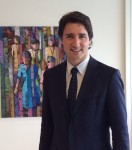Justin Trudeau, leader of the Liberal Party of Canada, was in Vancouver on April 10, and addressed a roundtable lunch organized by CJPAC. (photo by Cynthia Ramsay)
The Canadian Jewish Political Affairs Committee (CJPAC) hosted a community roundtable lunch on Thursday, April 10, with Justin Trudeau, leader of the Liberal Party of Canada.
“CJPAC seeks to activate the Jewish community in the Canadian political process, and roundtables such as these provide opportunities to build relationships and engage with elected officials from all political parties,” explained Mark Waldman, CJPAC’s executive director, in an email after the event.
“CJPAC is a multi-partisan, national organization that has been active in Vancouver for many years,” he added. As an example of the organization’s work locally, he noted, “Recently in Vancouver, CJPAC hosted an event called Women in Politics, which was attended by more than 30 women. Participants engaged on a personal level with former and current female politicians from a number of political parties and levels of government.”
Thursday’s lunch meeting took place in a boardroom at Blake, Cassels and Graydon LLP downtown. It seemed like a couple of dozen community members were in attendance. As they were leaving, Trudeau spoke briefly with the Jewish Independent before heading to another appointment.
“… I’m glad to say that any government of Canada will be supportive of Israel, not for ideological or political or strategic reasons, but because the values Israel stands for are Canadian values of openness, of respect, of democracy, of equality, and we need more of that, particularly in the tough neighborhood that Israel is in.”
“It went great,” he said about how the roundtable went. “We talked about, obviously, Canada’s support of Israel, which is extremely important to me and the point I made is that I am an unequivocal supporter of Israel. We need a two-state solution of a Jewish state on one side and a Palestinian state. Where I take issue a little bit with the prime minister these days is just that he’s tended to make it a little more of a domestic football, with some people being more supporters of Israel than others, and I’m happy to say that I love the prime minister for his support of Israel and thank Mr. Mulcair for his personal support of Israel as well, and I’m glad to say that any government of Canada will be supportive of Israel, not for ideological or political or strategic reasons, but because the values Israel stands for are Canadian values of openness, of respect, of democracy, of equality, and we need more of that, particularly in the tough neighborhood that Israel is in.”
Domestically, there have been changes made or proposed at the federal level over the years that, in the opinion of some, challenge those very values of openness, respect, democracy and equality, a recent example being Bill C-23, or the Fair Elections Act. When asked to describe his vision of the role of a federal government, Trudeau responded, “First of all, we have to understand that Canada is a federation, not a unitary state, so how we engage with different levels of government as a federal government – partnership with provinces, partnership with municipalities – and understanding the work together that we do as different levels of government all serves the same citizens.
“Giving a government a majority doesn’t give them the capacity to perpetuate themselves indefinitely by tricking the rules; that’s what happens in developing countries, that’s not what’s supposed to happen in Canada.”
“But even within the way Parliament functions,” he continued, “I made a strong commitment last June towards open Parliament, which would mean less whipped votes; open nominations, which would mean no omnibus bills, no misuse of prorogation, a lot more openness, the transparency around online posting of our expenses. Actually, what we announced in June last year then triggered similar announcements from everyone and now all of Parliament is starting to post online, and that was something that we triggered. So, I think when you look at that, when you look at the partisan approach to the Fair Elections Act – which is a very unfair elections act – I’m certainly trying to get the message out to Canadians that we do not need elections to be fixed in advance in favor of the Conservatives, and that’s exactly what’s happening. Giving a government a majority doesn’t give them the capacity to perpetuate themselves indefinitely by tricking the rules; that’s what happens in developing countries, that’s not what’s supposed to happen in Canada.”
With the defeat of the Parti Quebecois on April 7, there is reason to believe that its proposed Charter of Values will also go by the wayside. However, at least some of the sentiment that allowed it to be proposed in the first place – fear over immigration – likely still exists and, over the last few years, more than one European government has called multiculturalism a failure. In light of this, the Independent asked Trudeau what he thought about the future of multiculturalism in Canada.
“Multiculturalism in Canada is about building a diverse, flourishing fabric of a country that is strong, not in spite of its differences, but because of those differences.
“The German model of multiculturalism failed because they brought over temporary workers from Turkey and never allowed them citizenship, didn’t treat them like Germans and, even a few generations in, they never became [citizens]. Multiculturalism in Canada is about building a diverse, flourishing fabric of a country that is strong, not in spite of its differences, but because of those differences.
“And, I’ll say two things on Quebec. First of all, I, as of last fall, spoke very strongly in a number of editorials to Canadians to not get overly worked up about this Charter of Values, to trust Quebecers because Quebecers were not going to accept this, and I was pleased to see them show that on Monday night, and show that very strongly.
“But the second element: it does demonstrate how politicians can twist perceptions, and a lot of Quebecers who initially expressed support for the idea of the charter did so thinking they were sticking up for equality; you know, ‘liberating people from the oppressive yoke of religion,’ because, of course, in Quebec, that’s what happened through the sixties with their Quiet Revolution. But, as soon as people explained to them, no, this is about people having to choose between their religion or their job, Quebecers said, well, that doesn’t work at all, and that’s exactly what we have.”
When asked if he had any final words before the interview ended, Trudeau said, “Just what a pleasure it is to be out here in Vancouver. I had a great conversation with a number of strong members of the Jewish community and, unfortunately, we didn’t have enough time, so I look forward to coming back and doing this again soon.”

